

1
RESOURCE TOOLKIT FOR THE UALBANY COMMUNITY
In collaboration with the Interfaith Center, the Multicultural Resource Center presents the Interfaith Inclusion Toolkit. The Interfaith Center is dedicated to creating a space for organizations, students, and faculty to meet, explore, meditate, and practice their spiritual traditions. Our chaplains and faculty advisor offer guidance to support our students and groups by intentionally creating a welcoming and civil environment. We hope you use this toolkit to help our students and staff navigate differences respectfully and positively.
INTERFAITH CENTER KEY MESSAGE
The Interfaith Center seeks to spread the message of harmony and acceptance among the followers of all the world’s religions, faiths, and beliefs.
OBJECTIVES
1. To co-ordinate and unite the efforts of all the faith-based groups doing positive work with one focused theme at one specific time semesterly, thereby increasing their collective momentum and eliminating redundancy.
2. To promote the similarities between different beliefs rather than emphasize the differences and conflicts.
This toolkit contains links to videos, photos, articles, and shared resource folder to be used at the University at Albany to explore the spiritual practices and traditions, while also sharing the various ways our faith-based leaders collaborate with the Office of Intercultural Student Engagement.
1. Getting Started
a. What is Interfaith?
b. Interfaith Center Chaplains and Faculty Advisor
c. Interfaith Events

2. Getting Involved
a. Interfaith in Action
b. Faith-Based Student Organizations
c. Faith-Based and Community Initiatives
d. Religious Accommodations
3. Taking Action
a. Green Faith Initiatives
b. Social Justice and People of Faith
c. Download and print our posters here
WHAT IS INTERFAITH?
The word "interfaith" describes an interaction between people of different religions or faith traditions. But it is more than that. It is about understanding our significant differences, but also recognizing our similarities, and working together for peace, justice and healing in our world.
2
Figure 1Interfatih Center Logo
Interfaith cooperation is not about renouncing religions or combining all religions into one. In fact, many people find that their friendships with people in other traditions strengthen their understanding and respect for their own tradition.
Interfaith friendships reach out across the stereotypes and misunderstandings that lead to religiously motivated violence. They reinforce the idea that, regardless of religion or belief tradition, every human deserves respect.
Interfaith interactions live out the core values that are shared by all religions - values like compassion, respect, love, hope and peace, which are necessary for sustaining life in all communities. To learn more, click here.
The Interfaith Center creates a space for all religious, faith, and spiritual traditions to be celebrated.
INTERFAITH CENTER CHAPLAINS & ADIVSORS
The Interfaith Center has served the University community since 1966, providing space and opportunities for worship and meditation, programs to learn about other spiritual/faith traditions, and service projects. The center has five advisors supporting interfaith values through their work with the following student organizations: Cornerstone Campus Ministry, Hillel, The Newman Catholic Association, the Muslim Student Association, and the Buddhist Student Association.
Laurie DeJong Zuverinnk, She/Her, Protestant Campus Minister
The Protestant Campus Ministry board is thrilled to announce Minister Laurie DeJong Zuverink will serve as our Interim Lay Minister starting on June 1, 2023.
Minister DeJong Zuverink is a current Ph.D. student in Social Welfare, and she comes with years of ministry and social justice work. She is an active member and guest Minister at Journey United Church of Christ, where she also serves as the Leadership Team Chair and has served on the Leadership Team since 2021. Minister DeJong is passionate about the intersection of social work and religion. We know God has placed her here to help our students continue their ministry when Rev. Sandy Damhof retires this Spring.
Email: lzuverink@albany.edu

Phone: 518-442-5591
Catherine
Reid,
She/Her, Catholic Campus Minister
Cathy Reid is the Catholic chaplain at UAlbany, serving in partnership with All Saints Catholic Church. She has a master’s in theological studies from Emory University's Candler School of Theology. She is available for spiritual direction, conversation, and assistance with sacramental preparation. She lives in Albany and occasionally attempts gardening.
3
Email: creid@albany.edu
Phone: 518-442-5592
Rabbi Nomi Manon, She/Her, Campus Rabbi
Rabbi Manon has been the Executive Director of UAlbany Hillel for 14 years and is inspired by students every day. Nomi is a graduate of Alfred University and The Reconstructionist Rabbinical College, where she received her Rabbinic ordination. In Rabbinical school Nomi’s specialization was in campus work which focused on enhancing the Jewish experience of college students as well as non-profit management and fundraising. She is passionate about working at UAlbany Hillel, a pluralist organization that recognizes, supports, and encourages all types of Jewish expression. Nomi encourages students to explore their many identities and passions in a Jewish context. Nomi also teaches courses in Judaic studies where she is able to interact with a broad range of students in an academic setting. Nomi is always available for informal counseling and conversations about life, Judaism, politics, and relationships. Nomi has two daughters, Shoham and Advah
Email: nmanon@albany.edu
Phone: 518-442-5586
Imam Mansoor Rafiq Umar, Muslim Campus Chaplain
Imam Mansoor Rafiq Umar has been the Imam at the University of Albany since 2019. He is a B.A. graduate of the Darul Na'im Institute for Arabic and Islamic Studies seminary, husband to his beautiful wife, father to 5 amazing children. He serves as Imam at the Muslim Community of Bethlehem, and is the President of Halal Watch World, the first halal certification agency in the state of New York, and the founder and president of the United States Department of Halal Standards (USDHS). In addition, he has studied under various scholars of theology and Islamic legal theory and has networked with organizations and agencies worldwide.
Email: mumar@albany.edu
Phone: 518-925-7593
Dr. Aaron Proffitt, He/Him, Faculty Advisor to the Buddhist Student Association
Dr. Proffitt is an Associate Professor of Japanese Studies in the East Asian Studies Department at the University at Albany where he teaches broadly in the academic study of religion and Buddhist Studies. Dr. Proffitt teaches both introductory courses and advanced seminars on various topics spanning Theravada, Mahayana, and Vajrayana Buddhist traditions, and regularly takes students on field trips to visit diverse Buddhist temples in the Capital Region. Dr. Proffitt received his PhD in Buddhist Studies from the University of Michigan, conducted research in Japan as a Fulbright Fellow, and his book, Esoteric Pure Land Buddhism, was published in 2023 by the Pure Land Buddhist Studies Series of the University of Hawaii Press. In addition to his academic work, Dr. Proffitt is currently pursuing ordination in the Shin Buddhist tradition and serves the New York Buddhist Church as a Certified Minister’s Assistant and the Albany Buddhist Sangha (albanybuddhist.org) as Dharma leader and Dharma School coordinator.
Email: aproffitt@albany.edu
Phone: 518-442-4117
4
INTERFAITH EVENTS
Interfaith dialogue can unlock the power of religious traditions and provide the inspiration, guidance, and validation necessary for populations to move toward non-violent means of conflict resolution. Our interfaith events bring people together by creating a space welcoming to people of different religious or non-religious backgrounds. It provides an opportunity for collaboration, conversation, and action toward a common goal. Below are a few of the signature Interfaith Center Events:
IFC Mixer: Connect with students interested in practicing or learning about the Interfaith center and the groups affiliated with our office.
Unity Dinner: Every fall a dinner is held to celebrate the success of the semester, our similarities, and the upcoming new year.
Chaplain in Residence: Chaplains will be available throughout finals to listen and offer support in a safe, judgment-free space. Connect with an Interfaith chaplain to discuss spiritual, mental, or personal concerns.
Walking Labyrinth; Active Meditation for Finals: Labyrinths are used worldwide to quiet the mind, calm anxieties, recover balance in life, enhance creativity, encourage meditation, insight, self-reflection, and reduce stress. Click here to learn more about the benefits of walking meditation
Interfaith Dialogue Series
The Interfaith Dialogue Series is designed to present issues that impact the lived experience of everyday life from theological, religious, spiritual, ethical, and humanitarian perspectives.
• Faith in the Fight – organizing interfaith and secular coalitions for racial equity and justice.
• Women in Interfaith – explores female interfaith initiatives as agents of change for achieving a more inclusive sustainable peace.
• Race & Religion – explore the complexity and volatility of the relationship between race and religion, not only in the United States, but in other parts of the world.
• Green Faith Initiatives – The connection between religion and ecology and mobilizes faith communities to act.
Additional resources:
• Exploring the history of interfaith dialoguehttps://blog.hartfordinternational.edu/2022/01/25/history-of-interfaithdialogue/?gclid=CjwKCAjwiOCgBhAgEiwAjv5whBb1CDcGzWySDdY0vqdoGSLi5Q7LKZWF0xupHE2WpZzy1oMOnIo-hoCoYEQAvD_BwE
INTERFAITH IN ACTION
5
Promoting acceptance of diverse faiths, traditions, and cultures, The Interfaith Center provides a welcoming atmosphere where people can explore and grow in their beliefs while developing an appreciation for the beliefs of others. To create this atmosphere, consider the following below:
Events and programming
• Be mindful of spring holidays and days of observance. Reference multicultural and interfaith calendars to ensure that events and critical deadlines do not conflict with holidays.
• If serving food at events, provide dietary accommodations for attendees that are inclusive of diverse dietary restrictions and fasting guidelines.
For virtual classrooms or meetings
• Though we are now utilizing virtual learning, students who are fasting will still experience fatigue. Be aware of the times of day that assessments and meetings are administered.
• Record classes and meetings when possible.
• Be mindful of your physical actions and statements during virtual and in person meeting experiences. Try not to eat or drink on camera during virtual and in-person meetings
• Be conscious of the time deadlines are given for assignments and meetings.
Recommendations for everyone
• Be mindful of how you make announcements, so as not to target specific students.
• Do not assume all members of a religious community are fasting. There are several reasons as to why a person is not fasting. It is also not appropriate to ask why a person is not fasting.
FAITH-BASED STUDENT ORGANIZATIONS
Faith formation and reflective religious dialogue play an essential role in the education and development of the whole person. Our chaplains advise 5 religious/faith-based groups. They ensure that the organizations purpose, methods, and activities adhere to the values of their faith.
6
Cornerstone Protestant Campus Ministry
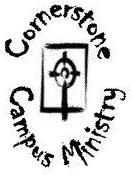
Cornerstone offers opportunities for Christians from all traditions for interaction, study, and service. Join us for a variety of activities and programs to help you grow spiritually and meet others, make a connection with a local congregation and serve the campus community through our Peer Minister program, and/or be part of making a difference in our community by volunteering for one of our mission/service projects.
Email: uacornerstone@gmail.com
Instagram: @ualbanycornerstone; Twitter: Cornerstone PCM;
Facebook: Cornerstone Campus Ministry
Linktree: linktr.ee/ualbanycornerstone
Website: https://www.ualbanycornerstone.org
Newman Association

A welcoming Catholic community for students looking to explore their faith, have fun together, participate in service projects for and with the wider community, and grow in their relationship with God and others.
Instagram: @ualbanynewman
Linktree: liknktr.ee/ualbanynewman
Hillel
Is an organization that is dedicated to empowering students to develop strong Jewish identities through creative self-expression. Our community is built on a foundation of pluralism and celebrated diversity. Our programs strive to provide Jewish learning, social connections, Shabbat and holiday celebrations, art, and culture, and most importantly a place where students can help change the world through tikkun olam.
Hillel’s mission is to enrich the lives of Jewish undergraduate and graduate students so that they may enrich the Jewish people and the world. Hillel student leaders, professionals and lay leaders are dedicated to creating a pluralistic, welcoming, and inclusive environment for Jewish college students, where they are encouraged to grow intellectually, spiritually, and socially. Hillel helps students find a balance in being distinctively Jewish and universally humanby encouraging themto pursuetzedek (social justice), tikkun olam (repairingtheworld) and Jewish learning, and to support a global Jewish peoplehood.
Email: info@ualbanyhillel.org
Instagram: @ualbanyhillel
Linktree: linktr.ee/ualbanyhillel

7
Muslim Student Association
In the name of Allah, the Owner, and Giver of Mercy. The Muslim Students Association is an organization geared toward providing religious, academic, and social services to the Muslim students on campus. Our goals include promotion of religious tolerance by working with other faith-based groups, educating the general campus community on the Islamic faith, uniting the campus community with the greater Capital District Muslim communities, and encouraging civic participation through community service events.
Instagram: @ualbanymsa

Linktree: linktr.ee/uamsa
Buddhist Student Association

The UAlbany Buddhist Student Association serves the community by creating space for students, staff, and faculty interested in Buddhism, spirituality, meditation, yoga, and mindfulness to explore and learn together. In addition to weekly meditation and cultural events, our organization regularly visits Buddhist temples from Theravada, Mahayana, and Vajrayana backgrounds, and volunteers in the community While many of our club members and e-board members are practicing Buddhists, given the diversity of Buddhist culture, our group is welcome to all who might be interested in putting the teachings of universal wisdom and compassion into practice. All are welcome!
Email: uabuddhistsa@gmail.com
Instagram: @ualbanybuddishitstudentassoc
Faculty Advisor: Dr. Aaron Proffitt, aproffitt@albany.edu
To learn more about our recognized faith-based student organizations visit MyInvolvement.org
FAITH-BASED AND COMMUNITY INITIATIVES
Our faith-based organizations, with the assistance of our chaplains and advisors, regularly lead and coordinate community programs and initiatives to fulfill the center’s core values. They are committed to participating in civic projects, regardless of whether the cause is secular or religious.
To participate in any of our community service initiatives or events throughout the academic year become a fan of our Engage UAlbany page.
The chaplains offer regularly scheduled programs that can be found on MyInvolvement.org or their social media pages
8
SACRED SPACES
The Interfaith Center, prayer spaces, and our meditation room are sacred spaces dedicated to cultivating spiritual life that serve as visible signs of the importance of faith at the University at Albany. These spaces are in the campus center.
• IFC Multipurpose Room Campus Center 346
o Open during center hours.
• Meditation Room Campus Center 346
o Opened during center hours. This room includes meditation cushions and soft lighting.
• Prayer Room Campus Center West 182
o This space includes a wudu/washing station.
o For more information regarding how to gain access to the prayer space, please contact the Muslim Student Association at ualbanymsa@gmail.com
There will be times during the academic year were our faith-based student organizations host spiritual events such as Ash Wednesday or Dias de los Muertos. During these events, we ask that the space be treated as sacred.
EATING ACCORDING TO RELIGIOUS PRACTICES: KOSHER AND HALAL

As the U.S. population continues to grow and diversify, religious dietary restrictions, such as kosher and halal, are increasingly followed.
The Kosher Diet: Food is kosher when it meets dietary requirements outlined by Jewish law or kashrut, making it acceptable for people observing those laws to eat.
The Halal Diet: Islamic dietary laws define which foods are halal. Halal foods are lawful and permitted to be eaten by those observing Islamic teachings. Muslims are not allowed to consume foods or beverages that are Haram or forbidden.
• The Muslim Student Association, with the assistance of the Imam, has coordinated meals for students observing Ramadan. Students who would like to participate must complete a form with the MSA
Additional resources:
• Why Do People Really Keep Kosher, Anyway?https://www.thespruceeats.com/why-keep-kosher-2121847
9
• What does Kosher mean? - https://www.medicalnewstoday.com/articles/what-iskosher
• What is Halal Food? - https://www.halalwatchworld.org/10-key-halal-questionsanswered
• New York’s Halal Food Protection Act -
https://agriculture.ny.gov/system/files/documents/2020/02/halalfoodsprotectionactbro chure_0.pdf
UNDERSTANDING FASTING PRACTICES
Religions and philosophies that practice fasting include Buddhism, Christianity, Islam, Judaism, Taoism, Jainism, and Hinduism. Fasting can last for just a few hours or even a few weeks, usually with practitioners eating at night. Interestingly, even within a religion, different denominations or sects may fast differently or at different times.
Fasting is to refrain from all drinking and eating. Exclusions include children or those who are physically unable to fast.
Lent Fasting: On Ash Wednesday and Good Friday, fasting rules allow Catholics to eat only one full meal and two smaller meals which, combined, would not equal a single normal meal. Additionally, Catholics may not eat meat on these two days–or on any Friday during Lent.
Fasting Observances Examples:
• Christianity: Lent
• Muslims: Ramadan
• Judaism: Yom Kippur
• Hinduism: The month of Śravaṇa
Additional resources:
• Fasting Around the World - https://culturalawareness.com/fasting-around-the-world/
• Religion Fasting Types & Purpose - https://study.com/academy/lesson/religiousfasting-types-purpose.html
• 6 religions other than Islam that require fasting -
https://tribune.com.pk/story/1117283/6-religions-islam-require-fasting
• How to support your Muslim coworkers who are fasting during Ramadan -
https://www.businessinsider.com/how-support-your-muslim-coworkers-who-arefasting-during-ramadan
• How to fast for Lent: A Practical Guide - https://gravityleadership.com/how-to-fastfor-lent/
10
WHAT IS MEDITATION?

Some archaeologists date meditation back to as early as 5,000 BCE, according to Psychology Today, and the practice itself has religious ties in ancient Egypt and China, as well as Judaism, Hinduism, Jainism, Sikhism and, of course, Buddhism. Meditation can give you a sense of calm, peace, and balance that can benefit both your emotional well-being and your overall health. It is not an attempt to escape from problems or difficulties, it is a willingness to go nose to nose with pain, confusion, and loss to seek understanding.
• In Buddhism, mindfulness and other forms of meditation can help one be present in a self-compassionate and nonjudgmental fashion, generate merit, purify karma, and attain perfect peace (nirvana)
• In Hindu meditation, the goal is to achieve liberation (moksha) by realizing the nature of one’s true self (atman).
• In Christianity meditation can mean contemplation of scriptural verse or can have an aim of experiencing God’s presence within you.
Additional resources:
• Dr. Aaron Proffitt (aproffitt@albany.edu) leads weekly mindfulness meditation sessions for the Buddhist Student Association and other groups in the Interfaith Center, and regularly gives guest lectures for various university courses, student groups, and other organizations.
11
YOGA – SPIRITUAL ROOTS OF A PHYSICAL PRACTICE
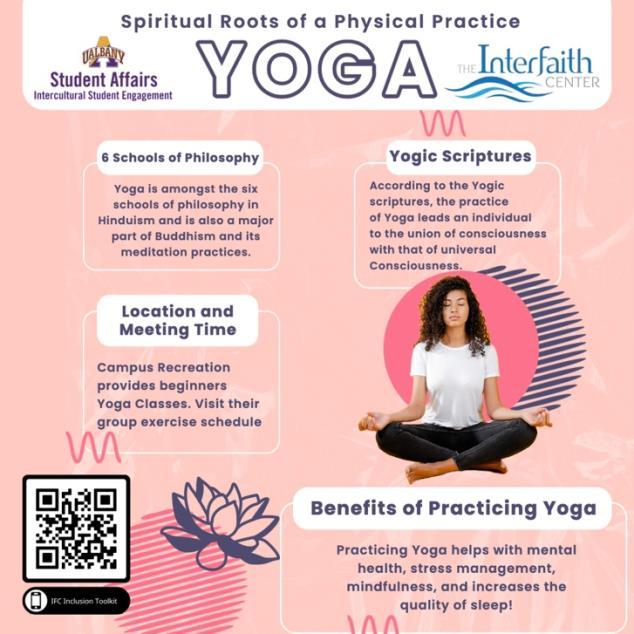
The original context of yoga was spiritual development practices to train the body and mind to self-observe and become aware of their nature. The purposes of yoga were to cultivate discernment, awareness, selfregulation, and higher consciousness in the individual.
The introduction of Yoga to the West is often credited to Swami Vivekananda (1863–1902), who first came to the United States of America in 1883. He organized world conferences by describing Yoga as a “science of the mind” and translated Yogic texts from Sanskrit into English. In 1893, during a visit to the US, he sparked the country’s interest by demonstrating Yoga at the 1893 Chicago World’s Fair.
Yoga is amongst the six schools of philosophy in Hinduism and is also a major part of Buddhism and its meditation practices. According to the Yogic scriptures, the practice of Yoga leads an individual to the union of consciousness with that of universal Consciousness. It eventually leads to a great harmony between the human mind and body, man & nature.
Additional resources:
• Campus Recreation provides beginner’s Yoga classes. Visit their group exercise schedule here.
WHY IS RELIGIOUS LITERACY IMPORTANT
Religion has played a central role in events throughout human history, from the most praiseworthy to the appalling and unspeakable. Its influence is at times ubiquitous, so much so that the conceptualization of religion as an isolated phenomenon is not universal. In many regions of the world, there are no “religious” or “secular” aspects of culture religion and culture are intertwined.
Religious literacy can be considered in three ways: Substantive, Functional, and Engagement. To learn more, click here.

12
To gain deeper insight into the history, practice and influence of the world’s religion consider taking a religious studies course at the university. This interdisciplinary program covers instructions across disciplines including history, Judaic studies, Africana studies, and philosophy. To learn more, click here
EASTERN VS. WESTERN RELIGIONS: WHAT’S THE DIFFERENCE?
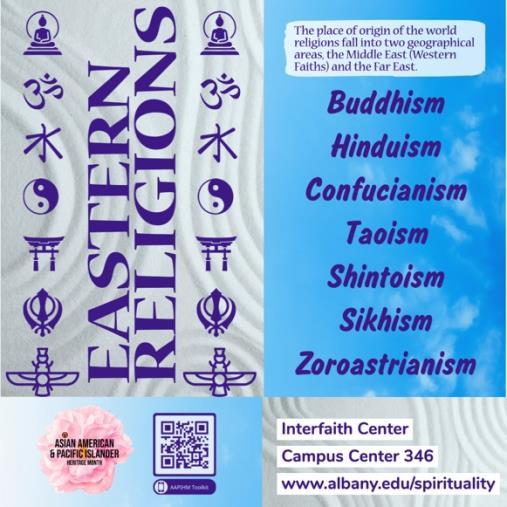
Eastern religions originated and are practiced in India, Japan, Southern Asia, and China. The Eastern religion incorporates Buddhism, Hinduism, Taoism, and Confucianism. Moreover, the Eastern religion accumulates Christianity, Judaism, and Islam. Therefore, the theme of worship is the main difference between these religions, in that the Eastern religions are polytheistic. In contrast, Western religions are monotheistic, worshipping and serving only one God. To learn more, take an East Asian studies course, read our AAPI Heritage Month toolkit, and stop by the Interfaith Center to connect with Dr. Proffitt, our faculty advisor for the Buddhist Student Association.
WORLD RELIGION DAY
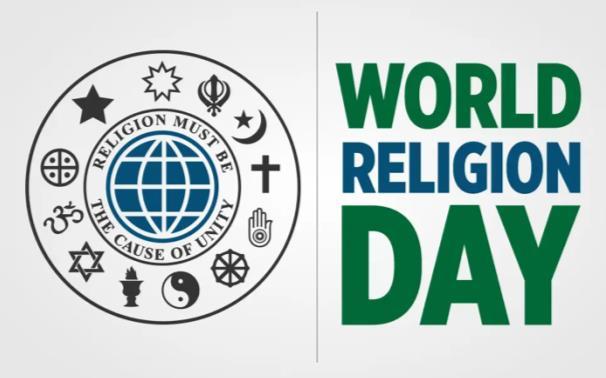
Every year on the third Sunday in January, people from all cultures and backgrounds come together World Religion Day. The day is intended "to spread awareness and knowledge of the thousands of religions practices in the world today, and a sharing of acceptance and understanding between people of all faiths.
The National Spiritual Assembly of the Baha’is of the United States initiated World Religion Day in 1950. The Bahá’í faith teaches the value of all religions. Additionally, this faith emphasizes the importance of universal equality and unity. To learn more, click here.
13
THE WORLD INTERFAITH HARMONY WEEK
The World Interfaith Harmony Week was first proposed at the UN General Assembly on September 23, 2010, by H.M. King Abdullah II of Jordan. Just under a month later, on October 20, 2010, it was unanimously adopted by the UN and henceforth the first week of February will be observed as a World Interfaith Harmony Week. To learn more, click here
Past themes: World Interfaith Harmony Week 1-7 February

• 2023 Harmony in a World in Crisis; watch here
• 2022 Faith and spiritual leadership to combat stigma and conflict during pandemic recovery.
• 2019 Sustainable Development through Interfaith Harmony
• 2016 Building Bridges across Boundaries
• 2015 Interfaith Prayer, Healing, and Community Services in the Cause of Peace
• 2014 Tolerance, Reconciliation and Forgiveness
• 2012-13 The Diaspora-a Force for Positive Change
THE POWER OF SPIRITUAL SYMBOLS
Spiritual symbols are a means to understanding the soul, sense of self, and oneness. Each spiritual symbol in the world is rooted in shared human experiences and carries forward important messages, reminding us to learn from the past, push for the future, and live in the present. As the symbols are commonly used to decorate jewelry items, it is imperative to understand their true meanings before wearing them on our bodies or decorating our homes with them.
Additional resources:
• 7 Spiritual Symbols to Deepen Your Yoga & Meditation Practice - https://vagabondtemple.com/7-spiritual-symbols-deepen-yogameditation-practice/
• The 24 Most Prolific Spiritual Symbols Explained - https://thegoodhuman.com/spiritualsymbols/
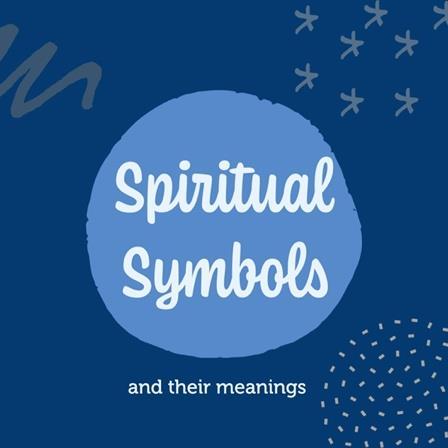
14
THE IMPORTANCE OF MUSIC IN DIFFERENT RELIGIONS
The relationship between music and religion can be found across many different religions such as Catholicism, Hinduism, Buddhism, and Islam. Since ancient times, religious ceremonies and worship have always involved music and this has been evidenced by traditions across different cultures and geographic regions. To learn more, click here

Additional resources:
• How religious music continues to impact the music scene today -
https://dailyorange.com/2018/10/religiousmusic-continues-impact-music-scene-today/
• Religion and Music at the Smithsonian - https://music.si.edu/story/religion-andmusic-smithsonian
• Music and Islam: A Deeper Look - https://asiasociety.org/arts/music-and-islamdeeper-look
SOCIAL JUSTICE AND PEOPLE OF FAITH

Religion has always had a powerful role in shaping ideas of social justice, oppression, and liberation. Religious communities also directly oppose repression and promote peace and reconciliation. Consider, for example, the Black church’s central role in the civil rights movement.
Additional resources:
• Bridging Faith and Social Justice Across Generations -
https://ssir.org/articles/entry/bridging_faith_and_social_justice_across_generations
• Jewish Center for Justice - https://jewishcenterforjustice.org/
• Interfaith America - https://www.interfaithamerica.org/
• Interfaith Alliance of Upstate New York - https://www.interfaithallianceupstateny.org/
15
• Bridging Faith and Social Justice Across Generationshttps://ssir.org/articles/entry/bridging_faith_and_social_justice_across_generations
Books on Spirituality, Religion, and Race
Title
The Cross and the Lynching Tree
I’m Still Here: Black Dignity in a World Made for Whiteness
I Bring the Voices of My People: A Womanist Vision for Racial Reconciliation
Radical Dharma: Talking Race, Love, and Liberation
Author
James H. Cone
Austin Channing Brown
Chanequa Walker-Barnes
Rev. angel Kyodo Williams, Lama Rodd Owens, Jasmine Sydullah Ph.D.
Rethinking Karma: The Dharma of Social Justice
The Inner Work of Racial Justice: Healing Ourselves and Transforming Our Communities Through Mindfulness
Islam and the Problem of Black Suffering
Islam and the Blackamerican: Looking Toward the Third Resurrection
RELIGIOUS DISCRIMINATION
“Religious discrimination is treating individuals differently because of their religious beliefs and practices and their request for accommodations of their religious beliefs and practices. It also includes treating individuals differently because of their lack of religious beliefs or practices.” ~Office of Civil Rights
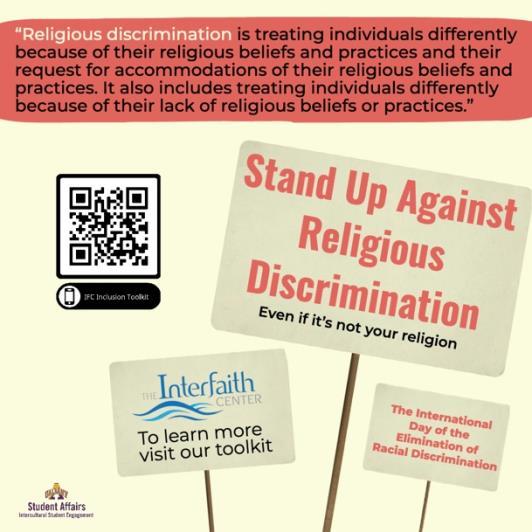
The term “religious minorities” encompasses a broad range of religious communities, traditional and nontraditional, recognized by the State or not, large and small, which seek the protection of their rights under minority rights standards. The diversity that exists within minority religious groups must be recognized.
Rhonda V. Magee and Jon Kabat-Zinn
Dr. Sherman A. Jackson
Dr. Sherman A. Jackson
16
Minority religions have often suffered from discrimination and persecution. Such discrimination has occurred across different geographical locations, independently from the creed of the minority and majority religions. An important starting point for tackling prejudice and discrimination against religious groups is to understand the extent of these issues as experienced by them. However, understanding the full scope of these issues can be challenging because systematic data on these experiences are often limited. To learn more, click here.
Additional resources:
• Stand up against religious discrimination – even if it’s not your religion video
• U.S. Equal Employment Opportunity Commission - https://www.eeoc.gov/religiousdiscrimination
• Combating intolerance against person based on religion or beliefhttps://www.ohchr.org/en/minorities/combating-intolerance-against-persons-basedreligion-or-belief
• The Rights of Religious Minorities - https://www.au.org/how-we-protect-religiousfreedom/issues/schools-and-learning/the-rights-of-religious-minorities/#
• Defending the Rights of Religious Minorities - https://www.aclu.org/issues/religiousliberty/free-exercise-religion/defending-rights-religious-minorities
THE INTERSECTION OF FOOD & FAITH
People of faith, houses of worship, and faith-based nonprofit institutions play a significant role in promoting the health and well-being of their communities through food. They grow food, feed the hungry, provide educational resources to congregants and communities to promote food justice, and participate in economic development through food-based enterprises. This report seeks to assess the food and faith practitioner landscape in the United States, with particular attention to justice-centered approaches pioneered by Black, Indigenous, and People of Color (BIPOC) communities.

Published: May 2021
Authors: Emma Lietz Bilecky, Alex Treyz, Sarah Zoubek, Deborah Hill
NAVIGATING LGBT IDENTITIES AND RELIGION
The relationship between religion and the LGBTQ community is a complicated one, and everyone experiences it differently. It all depends on how you feel, and what you choose. The relationship with religion is completely up to the individual. To learn more, click here
Additional resources:
• All We Want is Equalityhttps://www.thetrevorproject.org/resources/article/navigating-lgbtq-identities-andreligion/
17
• Religiosity Among LGBT Adults in the UShttps://williamsinstitute.law.ucla.edu/publications/lgbt-religiosity-us/
• For LGBTQ Equality in Jewish Life - https://www.keshetonline.org/
• Coming Home to Islam and to Self - https://www.hrc.org/resources/coming-home-toislam-and-to-self
• Faith Resource for Muslims - https://pflag.org/resource/faith-resources-for-muslims/
• Stances of Faith on LGBTQ Issues: Buddhism -
https://www.hrc.org/resources/stances-of-faiths-on-lgbt-issues-buddhism
• Buddhist LGBTQIA+ Resources - https://rainbodhi.org/resources/
• HAF Policy Brief: Hindu Teachings Inclusive of LGBT People -
https://www.hinduamerican.org/press/haf-policy-brief-hindu-teachings-inclusive-lgbtpeople
• Human Rights Campaign: Faith Resources - https://www.hrc.org/resources/faithresources
GREEN FAITH INITIATIVES

The Interfaith Rainforest Initiative is an international, multi-faith alliance that works to bring moral urgency and faith-based leadership to global efforts to end tropical deforestation. They provide a platform for religious leaders to work together with indigenous peoples, governments, civil society organizations and business on actions that protect rainforests and safeguard the indigenous peoples that serve as their guardians.
To learn more, click here
NATIVE AMERICAN RELIGION AND SPIRITUALITY
The diversity of Native American religions could fill whole libraries with descriptions of belief, tales of lore, definitions, explanations, and insights into spiritual practices and ceremonies. To the outside world, however, far too much of the truth remains generalized and horribly steeped in stereotypes and misconceptions. Efforts to pass down the old ways to new generations are constantly underway. This is primarily done through the oral tradition and by inviting tribal members to participate in various ceremonies and gatherings. To learn more, click here.
Additional resources:
• Native American Religions - https://dialogueinstitute.org/native-american-religions
• Native American Symbology - https://americanindiancoc.org/native-americansymbology/
18
THE SPIRITUAL MEANING OF THE SPRING EQUINOX
For thousands of years, many traditions, and our ancestors, have celebrated Spring Equinox as a time of fertility, rebirth of life, and energy –which is why today we find many traditional religious celebrations at this time - from St. Patrick’s Day to Easter and Passover, and Persian New Year. The Spring Equinox brings all of us on Earth a balance of day and night because the sun sits on the Earth's equator. The word equinox comes from the Latin words aequus (equal) and nox (night). To learn more, click here.
Today Spring Equinox is still one of the most anticipated and celebrated times of the year around the globe. From its Pagan Roots in the West to global festivals in the East, here's how our planet celebrates.
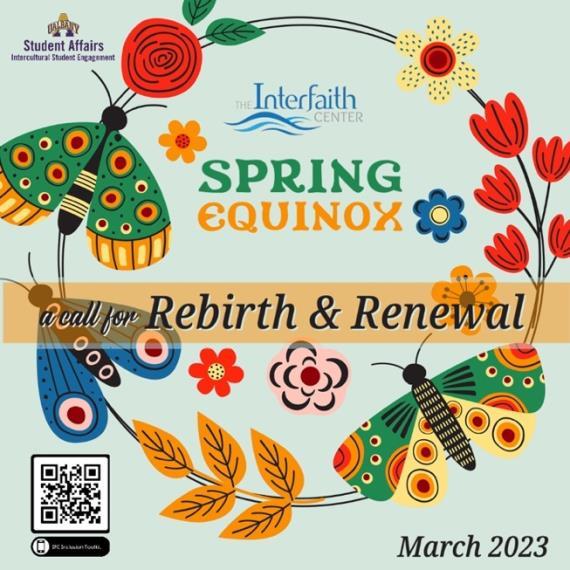
THE MENTAL HEALTH BENEFITS OF RELIGION & SPIRITUALITY
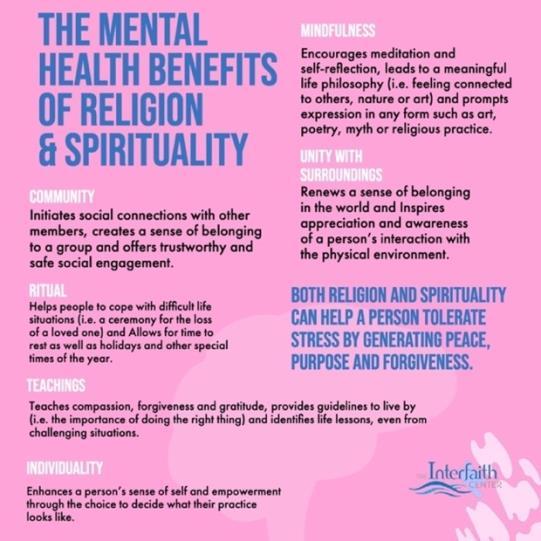
Both religion and spirituality can help a person tolerate stress by generating peace, purpose, and forgiveness.
Religion gives people something to believe in, provides a sense of structure and typically offers a group of people to connect with over similar beliefs. These facets can have a large positive impact on mental health research suggests that religiosity reduces suicide rates, alcoholism and drug use.
Additional resources:
• Science Says: Religion Is Good For Your Health -
https://www.forbes.com/sites/nicolefisher/2019/03/29/science-says-religion-is-good-foryour-health/?sh=2f7b9ca33a12
19
RELIGIOUS SCHOLARSHIPS & RECOGNITION
Criteria differs for all faith-based scholarships. Please review to the requirements of each award.
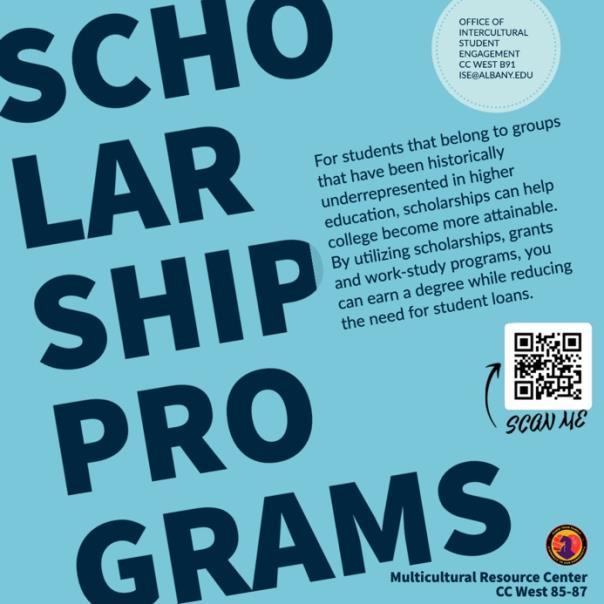
• Hillel International various scholarships
• President’s Award for Interfaith Leadership
• Student Association Purple & Gold Awards
• ISE Scholarship Directory
RELIGIOUS ACCOMODATIONS
Every student has the right to pursue their education while practicing their faith.
New York State law requires campuses to excuse, without penalty, individual students’ absences due to religious beliefs and to provide equivalent opportunities for makeup exams, study or work requirements missed due to such absences.
To request a reasonable religious accommodation, contact your course instructor(s) directly and with sufficient time for them to make the accommodation. Instructors should work directly with students to accommodate religious observances.
The following link provides upcoming major religious observances practiced by our students, faculty and staff: major religious holidays.
To learn more about religious accommodations at UAlbany, click here.
Additional resources: 2023 Holidays and Festivals - https://www.nccjtriad.org/wpcontent/uploads/2022/04/Interfaith-Calendar-2023.pdf
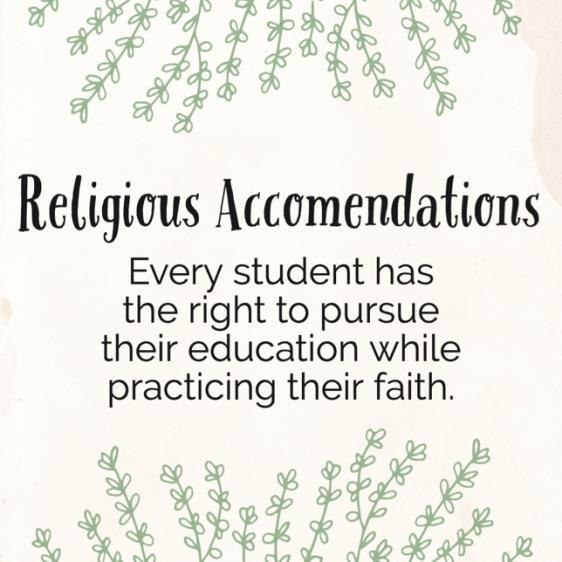
20
Not sure how to approach your professor about requesting religious accommodations? Here is a sample email you might send:
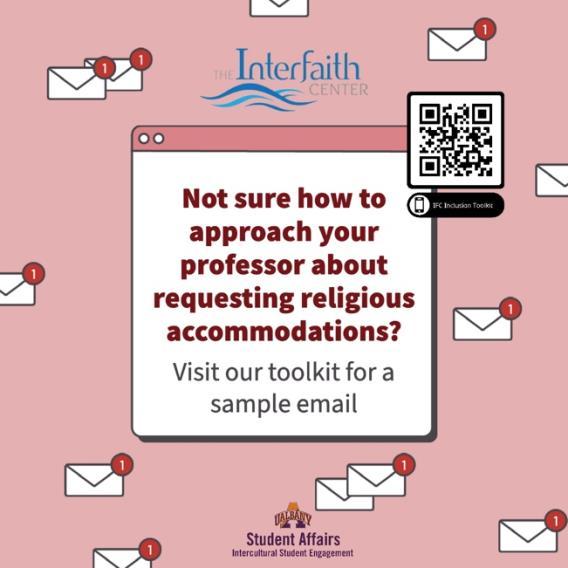
Subject: Religious Accommodation for [Course Number]
Dear Professor [last name],
I am enrolled in your course [course number]. I identify as an observing [religious affiliation], and I am writing to request that you make accommodation for my religious observance this semester in accordance with the college's attendance policy. On [enter date or dates] we will be observing [name of holiday]. This observance coincides with [name of assignment] that is listed on the syllabus.
I would like to work with you to explore how I can meet the requirements of your course while still honoring my religious practice. One option that I would propose is [enter request]. I would also be open to any other suggestions that you might have.
If it would be easier, I would be happy to talk with you about this further in person or by phone.
Should you have any questions about the reasoning or observance of this [name of religious holiday], please feel free to contact Arleny Alvarez-Peña, Associate Director for Multicultural, Interfaith, and Intersectional Affairs, at aalvarez-pena@albany.edu
Thank you in advance for accommodating my request.
Sincerely,
[Name, phone number optional]
For more information about the Multicultural Resource Center or the Interfaith Center contact: Arleny Alvarez-Peña, She/Her, Associate Director for Multicultural, Interfaith, and Intersectional Affairs
Email: aalvarez-pena@albany.edu Phone: 518-442-5565

21




























